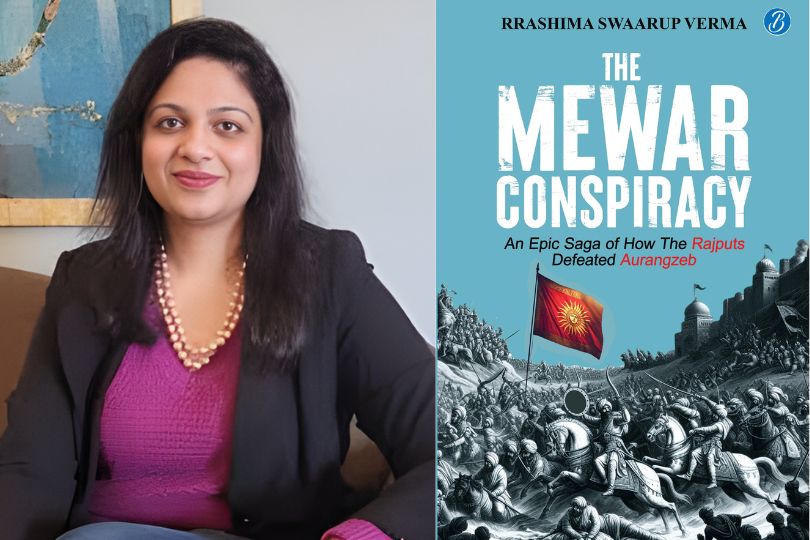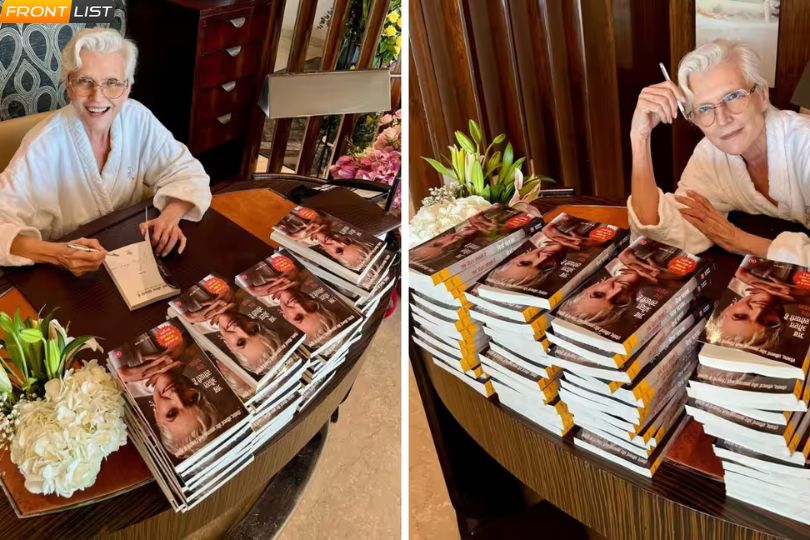Interview with Rrashima Swaarup Verma Author “The Mewar Conspiracy”
Rrashima brings alive Rajput valor, forbidden love, and royal intrigue in The Mewar Conspiracy—a gripping tale from Indian history.on Apr 24, 2025

Frontlist: The Mewar Conspiracy delves into a fascinating chapter of Indian history. What inspired you to bring this particular story to life?
Rrashima:I feel Indian history is much richer and more varied than most people understand. Ancient tales from a bygone era, if told in a riveting narrative style, can truly intrigue readers.
My interest in writing historical non-fiction started with The Royal Scandal – A Love Story That Changed the Power Dynamics in British India. This book became a bestseller, and readers shared with me how much they loved my style of writing historical non-fiction. That’s when I decided this was the kind of writing I wanted to pursue.
And yes, it was my literary agent, Suhail Mathur, who brought both these stories to me and helped me make my foray into this incredible genre.
Frontlist: Princess Charumati is at the heart of this epic saga. How did you approach developing her character—both as a historical figure and as a woman caught in the tides of power and love?
Rrashima: Other than being bold and beautiful, Princess Charumati was also a very brave and fearless Rajput princess. Her valiant attitude was the kind that many modern women would find inspiring. To make a choice and stand by it at a time when women did not have an equal place in society as men—well, that took some courage. It was that courage that lay at the core of this amazing character.
And the romance! It was the kind that would take anyone’s breath away.
I knew I had to do justice to this character, so I researched her as thoroughly as I could. I delved into the archives, spoke to historians and scholars, and pulled out every bit of information I could lay my hands on. It wasn’t easy because this happened so many centuries ago, but when you’re as intrigued by a story and a character as I was, you find a way.
Frontlist: The Rajput-Aurangzeb conflict is well documented, but your book explores the personal and emotional side of this historical war. How did you balance fact with storytelling?
Rrashima: In-depth, diligent research and a riveting style of narration are the two things that can make a historical account unputdownable. That’s how I balanced fact with storytelling. It’s very important to do justice to the authenticity of the story and the characters when the book is based on true facts. It is equally pertinent to narrate the story in a way that retains its depth and keeps the reader hooked. Dialogue plays a major role here, as does the description of the setting. A story set in a time and place as fascinating and beautiful as 17th-century Rajputana and Shahjahanabad—well, the description has to be just as vivid. That’s how the tale comes alive for the readers. And, of course, the emotion. There were instances when I had tears in my eyes even as I sat at my desk writing. Such was the impact of their courage, sacrifice, and love.
Frontlist: Rana Raj Singh’s role in defying Aurangzeb was crucial. What aspects of his leadership and personality stood out to you during your research?
Rrashima: When I heard about this story from Suhail, I was utterly thrilled to know that I would be researching one of the greatest Rajput warriors in history. The fact that he comes from the same lineage as Maharana Pratap only made it all the more clear to me how much I wanted to write this book. Rana Raj Singh, other than being an expert in military matters, was also a romantic man who took on a herculean task to honor the woman he loved.
Mewar, historically, had been among the only Rajput kingdoms that managed to withstand the pressure of aligning with the Mughals. Rana Raj Singh lived up to this legacy with great commitment. There was so much he did for his state, so much good he brought about. It’s all there in the book, as well as summarized in the epilogue.
Frontlist: Given the depth of historical detail in your book, what was the most challenging part of weaving historical accuracy with compelling narration?
Rrashima: Research is the most important tool when writing historical nonfiction. As a seasoned researcher (it is my profession, after all), I am adept at the process of extracting the most challenging information and validating it from multiple sources—both secondary and primary. In fact, the book includes a detailed list of references at the end, which is evidence of the extensive work that has gone into the process. Moreover, its endorsement by noted historians and historical writers such as Dr. Shankar Kumar, Salma Husain, Diwan Gautam Anand, and Mr. B.K. Karkra further validates its accuracy.
Frontlist: How did you research the intricate details of Rajput and Mughal history? Were there any lesser-known facts that surprised you during your research?
Rrashima: Like I mentioned before, I dug deep into the archives—that is always a wonderful starting point. This was followed by in-depth conversations with people who have a position of knowledge: historians, noted individuals from the Archaeological Survey of India, scholars, and professors of history. I visited both sites—Udaipur, which was the official seat of Mewar, as well as Shahjahanabad, the capital of the Mughals at the time. Meeting and interacting with people at these sites made the picture much clearer and filled a lot of gaps.
History is always intriguing and full of surprises. The fact that a warrior like Raj Singh was such a romantic, the details of the ambush and the war, and, of course, the tragic story of Ratan Singh Chundawat and Sahal Kunwar, better known as Hadi Rani, were all incredible subplots that added to the book. I was also surprised to learn certain facets of Emperor Aurangzeb’s personality that I didn’t know before I started researching this tale.
Frontlist: You’ve written about royalty before in The Royal Scandal. How does The Mewar Conspiracy differ in terms of its themes and approach?
Rrashima:Both these books are true tales of love, war, sacrifice, and intrigue from Indian history. While The Royal Scandal is set in 18th-century Deccan, The Mewar Conspiracy is set in 17th-century Rajputana and Shahjahanabad. These books required intense research and character development. The protagonists of The Royal Scandal were as fascinating as the three characters in The Mewar Conspiracy. And yes, it was definitely an incredible experience to write about the palaces, clothes, traditions, jewelry, and food described in both books.
The splendor and mysticism of the Deccan, the magnificence and might of the Mughals, and, of course, the valor and grandeur of the Rajputs—all of it was captivating. Not to forget that both books have incredibly strong female protagonists. Begum Khair-un-Nissa as well as Rajkumari Charumati—well, they were the kind of women who could inspire and set a tremendous example for all of us.
I’ve been lucky to have been given the opportunity to write these books. Thank you, Suhail, for bringing such fabulous stories to me.
Frontlist: Did you face any challenges while reimagining historical events for a modern readership? As a writer, poet, and speaker, how do these different aspects of your creativity influence your storytelling?
Rrashima: I think my love for poetry most definitely helped me since those were romantic, poetic eras. Poetry, Sufism, music, and mushairas—that was the atmosphere, and I was able to connect and emote with it. For instance, Zeb-un-Nissa, Aurangzeb’s daughter, was a very gifted poet, and there are several anecdotes about this in The Mewar Conspiracy.
As far as imagining and creating that atmosphere for a modern reader is concerned, I think readers these days are immensely intrigued by the past and very keen to read these stories. As a writer, I enjoy stepping into a different time and place, away from the mundane. I love becoming a part of the story—sometimes even a spectator—to be able to imagine and envision, so that I may see the events unfold and then regale the reader with my imagination and creativity.
Both these books have brought out the best in me and made me realize my true potential as a writer. I am so grateful to my literary agent, Suhail Mathur of The Book Bakers, my publisher, Arup Bose of Srishti Publishers, as well as my editor, Stuti Sharma Gupta, for supporting me and bringing these books out for the world to read.



.jpg)






.jpg)

.jpg)
.jpg)

.jpg)
.jpg)










Sorry! No comment found for this post.